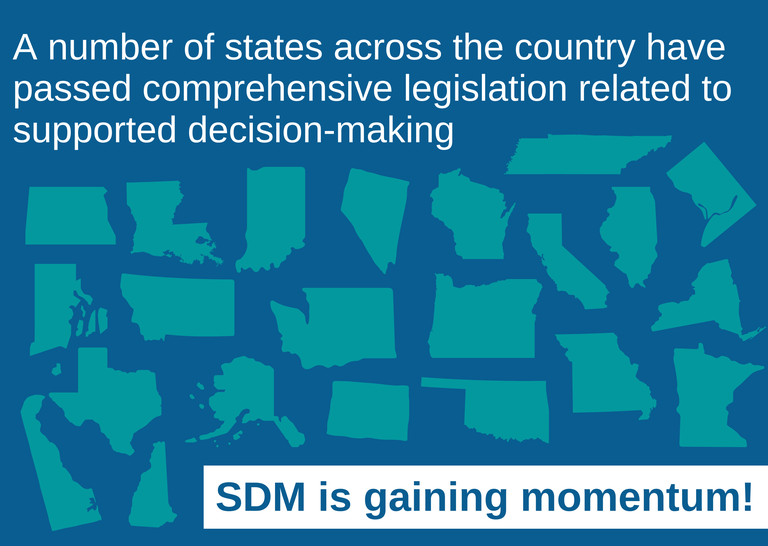SDM Agreements
Written Supported Decision-Making Agreements (SDMAs)
Supported Decision Making (SDM) is a way for adults with disabilities to make their own decisions with the help of trusted friends or family members. Unlike guardianship, SDM lets adults with disabilities make their own decisions with the help of trusted friends or family members. The adult with a disability can be called the “decision maker. The people that help them make decisions can be called “supporters”.
Many people use supported decision making without having written agreements. However, it is a good idea to have the decision maker put into writing what they do and do not want help with. Then, the decision maker and their supporters sign the document. This way, everyone knows what is expected. The written agreement is called a Supported Decision-Making Agreement (SDMA).
See some examples of SDMAs below.
27 States + the District of Columbia (D.C.) Have Passed Laws About SDM
There are 27 states in the United States, plus the District of Columbia (D.C.), that have passed laws about Supported Decision Making (SDM). Of these, 21 states and D.C. have laws that make Supported Decision-Making Agreements (SDMAs) legally valid documents. This means that these agreements can be used in the same way as other legal documents. In these states, SDMAs can be used to help adults with disabilities make their own decisions, with the help of trusted friends or family members.
In addition to these 21 states and D.C., several other states have changed their laws about guardianship. These laws now require that alternatives to guardianship, such as SDM, be tried before a guardianship order can be issued. This means that adults with disabilities in these states have the opportunity to make their own decisions, with the help of trusted supporters, before a guardianship order is put in place.
Texas was the first state in the United States to pass a law related to SDM. This law made SDMAs legally valid documents and was passed in 2015. Since then, 20 other states and D.C. have passed similar laws: Delaware (2016), Wisconsin (2017), D.C. (2018), Alaska (2018), Tennessee (2018), Indiana (2019), North Dakota (2019), Nevada (2019), Rhode Island (2019), Louisiana (2020), Washington (2020), New Hampshire (2021), Illinois (2021), Colorado (2021), Virginia (2021), New York (2021), Oregon (2021), California (2022), Maryland (2022), Alabama (2023), and Arizona (2023). In addition, several other states have revised their guardianship laws to recognize SDM as an alternative to guardianship: Missouri (2018), Maine (2019), Minnesota (2020), Montana (2021), Oklahoma (2021), and North Carolina (2023) .

Laws about Supported Decision-Making Agreements (SDMAs) will Help
There are several good reasons to have laws about Supported Decision-Making Agreements (SDMAs).
- SDMA laws can specify what is needed to make and end an SDMA.
- SDMA laws can protect supporters and businesses that follow SDMAs from being sued.
- SDMA laws can make it a crime for someone to break the trust in an SDMA.
In Kansas, these laws could be similar to the laws about Power of Attorneys, in the Power of Attorneys Act.
More Ways Laws about SDMAs Would Be Good for Kansas
A Law About SDMAs Would:
1. Encourage Kansans to use SDM and Reduce Unnecessary Guardianships
An SDMA law would legally recognize Supported Decision Making. This would encourage supporters to use SDM. It would make it easier for supporters to use SDM. Making a law about SDMAs adds legal protections for supporters and businesses that honor SDMAs.
2. Save the State Money
An SDMA law would save Kansas money. SDM helps keep people out of the court system. This helps the court focus time on guardianship cases only when they are really needed. An SDMA law would save Kansas court resources and time.
3. Protect People with Disabilities from Abuse & Neglect
SDM empowers people with disabilities. Unlike a supporter, a guardian has sole control over the person in their care's life. SDM lets people with disabilities have more people in their support system. This keeps people with disabilities safer.
4. Keep Loved Ones Involved
SDM makes it easier for loved ones to stay involved in the person with a disabilities life. Much less paperwork is needed for an SDMA than for a guardianship. An SDMA law would allow for communication between supporters, decision-makers, and others, without lots of legal documents.
5. Give People with Disabilities a Better Life
SDM gives people with disabilities a better quality of life. When you are able to make choices, you are more self-determined. Self-determination means we do things ourselves and make decisions, instead of having things done to us. Research shows that more self-determination helps people be more independent. Self-determination helps people be more involved in their community. Self-determination helps people better understand bad situations that could hurt them and avoid abuse.
6. Give Families Freedom
The court is an important tool to protect people from abusive guardians. But guardianships can mean the court and government are very involved in your family’s life. SDM protects families from unnecessary government interference. It gives families a way to help adults with disabilities make their own decisions, without going to court.
7. Give Families an Affordable Option
Guardianship is very expensive. The cost of setting up a guardianship can range from $5,000 to $7,500 or more. There are fees every year for reports. Going to court to end an unneeded guardianship is expensive. SDM lets all families legally support their loved ones, no matter how much money they have. SDM is an affordable option for families who do not need guardianship. There isn’t the cost of going to court with SDM. SDM gives all families more options.